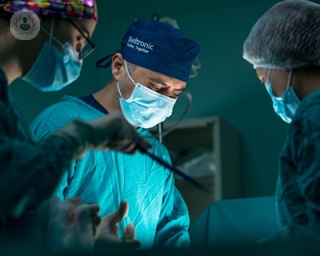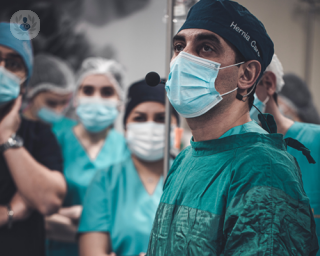Inguinal hernia
Mr Stefano Giuliani - Paediatric surgery
Created on: 11-13-2012
Updated on: 10-09-2023
Edited by: Sophie Kennedy
What is an inguinal hernia?
A hernia occurs when part of the internal organs or tissue pushes through a weakness in the muscle wall. An inguinal hernia is said to occur when part of the bowel or fatty tissue pushes into the groin at the top of the thigh. It is also the most common type of hernia, particularly in men. Inguinal hernias are rare in females.

What are the symptoms of an inguinal hernia?
Symptoms of an inguinal hernia are a swelling or a lump in the groin or an enlarged scrotum. There may also be associated pain or discomfort, pain when coughing or lifting, or a dragging sensation in the groin. A bulge either side of the pubic bone could also be a sign of an inguinal hernia.
What causes an inguinal hernia?
In males the testicles descend during development via a small opening in the groin. This process leads to a weakness in the abdominal wall and is the cause for inguinal hernias. In boys, there is usually a sac which accompanies the testes. Generally, it is supposed to close but occasionally the sac remains, leading to a hernia.
In adults, undue straining such as heavy lifting, violent coughing or prolonged straining on the toilet may cause the hernia to develop due to the underlying weakness in the groin. Loss of elastic tissue due to the ageing process also leads to inguinal hernias. It is not unusual for hernias to occur in both groins.
How can an inguinal hernia be prevented?
Avoiding undue pressure in the abdomen by straining when passing stool or urinating or carrying and moving heavy loads can reduce the risk of an inguinal hernia, however many hernias may be unavoidable as they have no apparent cause. Strain on the abdominal muscles can be reduced by maintaining a healthy weight, eating a high-fibre diet and stopping smoking.
How is an inguinal hernia treated?
Surgery is the usual treatment for inguinal hernias as the body is unable to heal a hernia without intervention. In some patients a non-surgical option, such as a hernia truss which helps to hold the hernia in place, may be appropriate.
Occasionally it may be deemed safe to wait and watch and monitor the hernia. Surgery becomes an emergency for hernias that cause severe pain or that have developed complications. Strangulation, where the bowel has become trapped, is one such complication and it requires immediate treatment to restore the blood supply via surgery.

Does an inguinal hernia always require treatment?
Hernias will not heal on their own and will require surgery to fully be resolved. If the hernia is deemed safe and doesn’t disrupt the patients the life, they may be able to delay surgical treatment. Over time, however, inguinal hernias tend to get larger and can go on to cause serious complications if not attended to carefully.
When does an inguinal hernia become an emergency?
The hernia may be pushed back in when lying down, however complications can occur whereby the hernia gets stuck or trapped and obstructs the bowel, or the hernia becomes strangulated, whereby the blood supply gets cut off. This is potentially very serious, even life-threatening and requires immediate attention. Symptoms of a strangulated hernia include vomiting and nausea, fever, sudden pain, a bulge that turns red or purple, or an inability to pass stools or gas.
How can patients waiting for or delaying surgery prevent an inguinal hernia from becoming worse?
Patients waiting for or delaying inguinal hernia surgery should be regularly monitored by a physician to prevent serious complications. Maintaining a healthy body weight with a high fibre-diet and consuming plenty of water will help prevent the hernia from worsening. It is also important that patients with an inguinal hernia avoid heavy lifting and core exercises, such as sit-ups or planks.
What type of doctor treats an inguinal hernia?
Although a general physician will be able to diagnose an inguinal hernia, general, colorectal and upper GI and bariatric surgeons treat inguinal hernias.

















